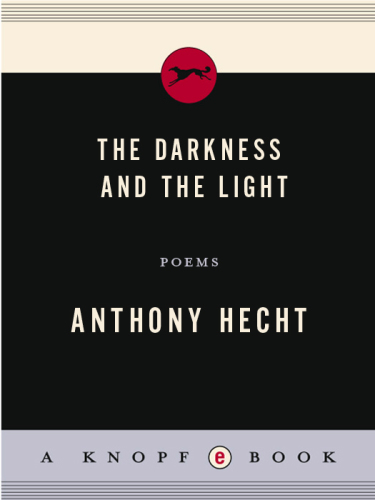
The Darkness and the Light
Poems
کتاب های مرتبط
- اطلاعات
- نقد و بررسی
- دیدگاه کاربران
نقد و بررسی

May 14, 2001
"Look deep into my eyes. Think to yourself,/ 'There is "the fringèd curtain" where a play/ will shortly be enacted.' Look deep down/ into the pupil. Think, 'I am going to sleep.'" While a certain kind of play is certainly being enacted in this eighth collection (since Hecht's 1954's debut A Summoning of Stones, few readers will have the latter reaction. Hecht's has always tempered his fussy, Edward Gorey–like diction with camp-destroying earnest allusion, wry humor ("the ring-a-ding Ding-an-Sich") and a palpable sense of entitlement. These 44 short lyrics are quintessential late work—alternatingly fiery and melancholy, looking back over past darkness and strife to a promise of light and rest, and to a personal pantheon (Baudelaire, Horace, Goethe) represented here in nine translations. Yet the book is cohesive in theme, keeping to the shadowlands throughout poems like the Dickinson nod "A Certain Slant" ("the smooth cool plunder of celestial fire") and the crashing "Witness": "The ocean rams itself in pitched assault/ And spastic rage to which there is no halt;/ Foam-white brigades collapse; but the huge host/ Has infinite reserves." Such reserves are not quite accessible to the poet here, but Hecht, with his baroque rhyme and forceful diction, operates as if they were. (June 28)Forecast:Former Academy of American Poets chancellor Hecht won the Poetry Society of America's prestigious Frost Medal last year and the Pulitzer Prize in 1968 for
The Hard Hours. In the last decade he delivered the prestigious Mellon lectures in poetry, which became 1995's
On the Laws of Poetic Art. Longtime fans will seek out any book by this never-overpublishing poet; a revision of 1990's
Collected Earlier Poems seems imminent.

June 15, 2001
Hecht's (Flight Among the Tombs, The Hard Hours) refreshing and liberating verse possesses a quality that transcends both time and space. In his eighth book of poetry, the Pulitzer Prize-winning poet pulls the reader into an ocean that "rams itself in pitched assault/ And spastic rage to which there is no halt; / Foam-white brigades collapse; but the huge host/ Has infinite reserves." It is his striking use of "r" and "o" sounds, creating a cadence of rising and falling within the meter of the line ("against the enormous rocks of a rough coast") that demonstrates Hecht's linguistic control. In the past, Hecht has revealed the scope of his craft in his quality translations of Horace, Baudelaire, and Goethe; here, he pays homage to his predecessors by bringing to light the strong connection between contemporary and biblical themes in such poems as "Sacrifice" and "The Road to Damascus." An exceptional book of poetry, Hecht's latest endeavor is highly recommended for all poetry collections. Tim Gavin, Episcopal Acad., Merion, PA
Copyright 2001 Library Journal, LLC Used with permission.

May 1, 2001
Like David R. Slavitt and Dana Gioia ["Classicists" BKL Mr 15 01], Hecht knows his classics and uses them, to the extent of including translations of ancient, medieval, and modern master poets in this book. He appreciates the perdurable forcefulness and relevance of classic situations and conceits. He sees in the predicament of weekend fathers patrolling "the Olmsted bosks of Central Park, / Its children-thronged resorts, / Pain-tainted ground" that of lost souls in a circle of a Dantesque hell. Many poems borrow from the Bible, allusively in "The Hanging Gardens of Tyburn" (Tyburn was eighteenth-century London's gallows), and directly in "Saul and David," "Judith," "The Road to Damascus," and others. "Sacrifice" juxtaposes God's trial of Abraham and Isaac with a modern incident in which a fleeing German soldier threatens but spares a French farm family's 14-year-old son; the poem challenges each reader to ponder the historical as well as theological nature of mercy. These provocative, impeccably crafted poems are to be read repeatedly and not exhausted. They are, in short, classical.(Reprinted with permission of Booklist, copyright 2001, American Library Association.)

























دیدگاه کاربران